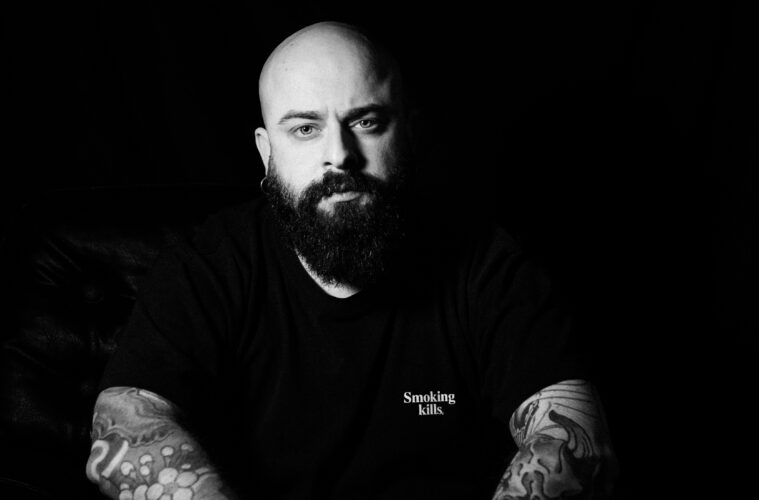In occasione dell’uscita di “Coordinated Beatdown EP”, abbiamo avuto il piacere di incontrare Raffaele Attanasio per parlare del suo ultimo lavoro con The Advent, della nascita di South Signatures Records e di come, oggi, la techno possa ancora essere una questione di autenticità.
Raffaele Attanasio è una delle voci più riconoscibili della scena techno italiana e internazionale. Tra le produzioni per Axis Records e il lavoro con la sua etichetta South Signatures Records (SOU), il suo percorso segna un’evoluzione costante, tra club culture e integrità come forma di resistenza artistica.
“Coordinated Beatdown EP” è un lavoro diretto, compatto, che restituisce alla techno la sua essenza fisica. Pubblicato su South Signatures Records il 3 ottobre – in versione vinile e digitale – il disco si muove con rigore e istinto.
Quattro tracce, quattro declinazioni di un’idea comune: il suono come materia viva.
Al centro del progetto c’è il dialogo con The Advent (Cisco Ferreira) – pioniere della scuola techno britannica – che incontra l’approccio più corporeo e mediterraneo di Raffaele Attanasio. Ne nasce un suono ibrido, dove la geometria inglese e la sensibilità napoletana si fondono in una stessa idea di autenticità.
“Binary Pulse” apre con un impatto netto, seguita da “Echo Alliance” che scava più a fondo, attraverso una tensione continua di frequenze. “Divide” porta equilibrio e sospensione, un momento quasi meditativo, per finire con “Spillo” che chiude con una luce diversa, più intima, quasi malinconica.

Ciao Raffaele, benvenuto su Parkett!
Partiamo da “Coordinated Beatdown EP”: un lavoro diretto, dove ogni suono sembra avere un’intenzione precisa. Com’è nato questo progetto?
Tutto è iniziato in modo molto spontaneo, da una chiacchierata.
Abbiamo unito le idee di due persone che hanno vissuto epoche diverse della techno: Cisco un tempo, io un altro, e ora ne stiamo vivendo insieme un altro ancora. Cisco mi ha mandato del materiale e da lì è cominciato tutto.
Il progetto doveva uscire ad aprile, poi è slittato per via di un lungo periodo di stop forzato – e forse è stato un bene, perché il tempo ha fatto bene al disco. Oggi le tracce stanno andando davvero bene: è un EP nato con calma, senza strategia, e forse proprio per questo è arrivato con più forza.
Quindi tutto è nato durante una seconda fase?
Sì. È stata una di quelle situazioni in cui capisci quanto la musica ti tenga vivo. Dopo lo stop forzato ho ricominciato ad ascoltare, a sistemare i suoni, a mettermi davanti alle macchine. È stato un modo per ritrovare equilibrio.
E poi, devo dire, questo progetto per me ha avuto anche un significato molto personale. Coordinated Beatdown è dedicato ad un amico che non c’è più, una persona con cui avevo condiviso tanto.
È un lavoro diretto, vero, nato da un’energia condivisa e da un sentimento di gratitudine.
Cisco Ferreira, alias The Advent, è un artista con un percorso molto diverso dal tuo. Com’è nata questa collaborazione e che tipo di rapporto si è creato tra voi?
A distanza, con una fortissima sintonia. Non ci siamo dati regole: ci siamo lasciati guidare dal suono. Credo che, in realtà, non siamo così diversi – solo due modi diversi di dire la stessa cosa. La mia è una tendenza a volte più melodica, la sua più diretta, eppure il risultato è stato un punto d’incontro naturale. È la dimostrazione che si può parlare la stessa lingua anche con accenti diversi.
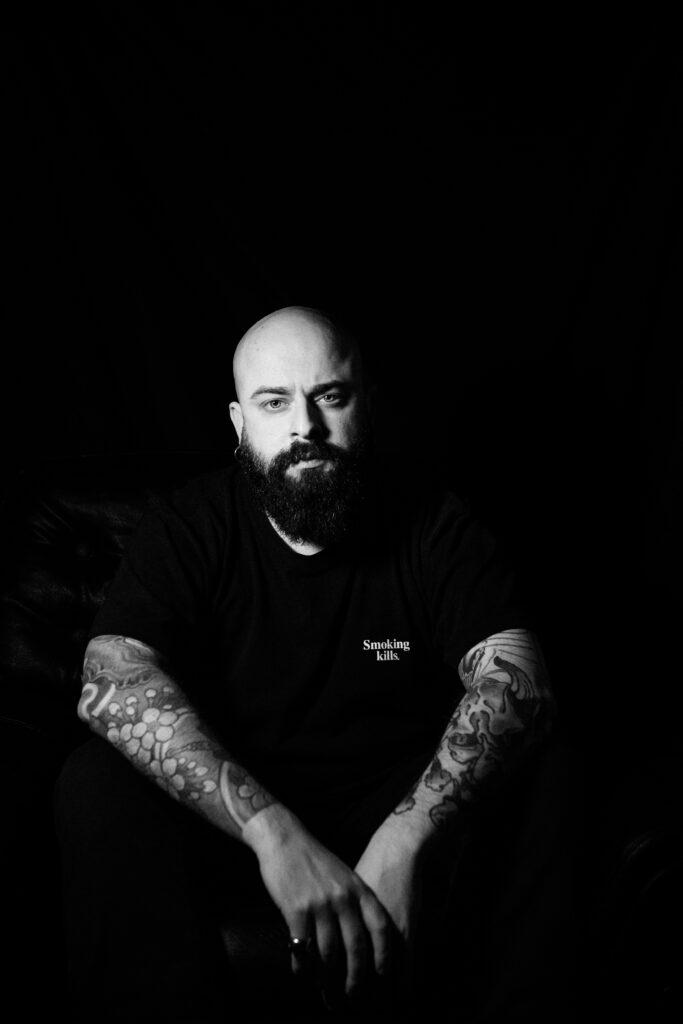
Come hai lavorato sull’EP, a livello tecnico? Come prepari un setup in studio?
Nel caso delle collaborazioni, come con Cisco, una volta ricevute le parti le carico nel progetto e comincio una sorta di Tetris sonoro: metto insieme, taglio, cambio, aggiungo. Lavoro molto sul sound design: sposto i suoni, li faccio respirare, cerco la timbrica giusta e il dialogo tra armonia e ritmo. Se un’idea non funziona viene cestinata all’istante.
Prima di iniziare un progetto passo anche giornate intere a preparare i miei template: è un modo per avere tutto pronto, come preparare gli strumenti prima di suonare. Accendo i sintetizzatori, creo template, patch personali, combinazioni suoni, giri di basso, melodie. Poi, quando arriva il momento giusto, registro. Di pancia. Penso già a come i suoni si incastreranno tra loro.
Quindi l’aspetto manuale è ancora centrale.
Mi piace l’imperfezione delle macchine, il modo in cui reagiscono.
Ti capita di cambiare completamente direzione su una traccia?
Spesso. In “Coordinated Beatdown”, per esempio, l’ultima traccia l’ho rifatta quattro o cinque volte. Aveva una linea più melodica, ma non rispecchiava l’identità del progetto. Se un’idea non fluisce, come ho detto prima, la cestino e ricomincio.
Quando lavori su musica di altri, come in questo caso, hai una doppia responsabilità: rispettare la loro identità ma anche arricchirla con la tua. Cisco mi ha lasciato totale libertà, e questo è fondamentale.
Ti sei dato delle regole?
Sì e no. Durante la creazione cerco spontaneità. Quando hai un suono di base ben definito, il resto viene da sé. Se conosci bene le tue macchine, sai già dove andare. Tutto parte dal suono: la costruzione, la fisicità, la dinamica. Soprattutto in questo caso, devono mantenere quella spinta “fisica” che viene dal club, dal dancefloor.
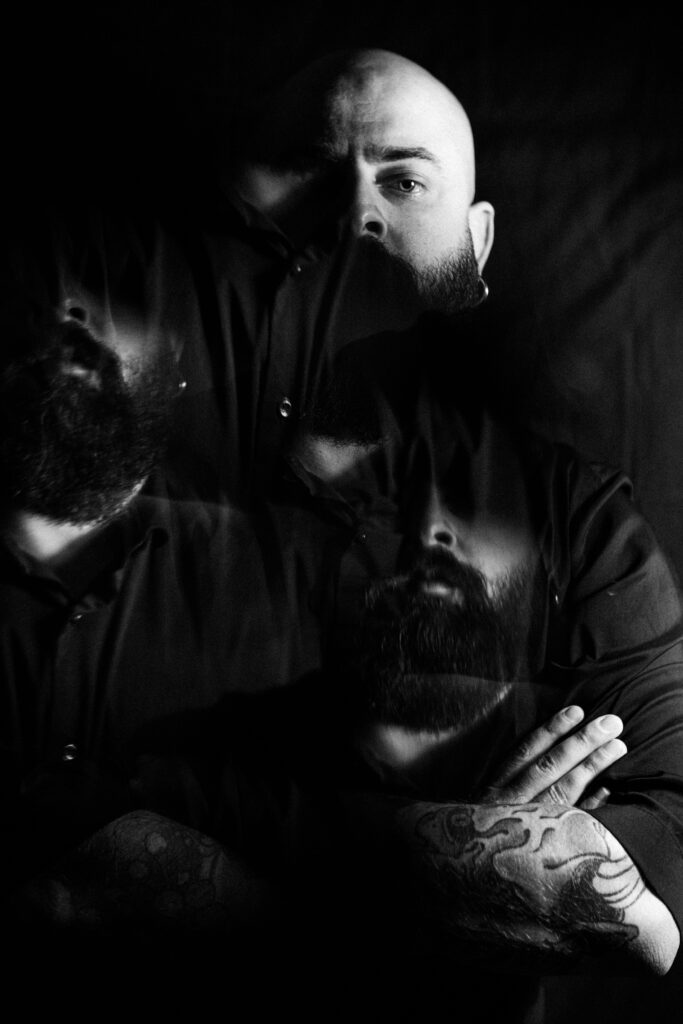
Parliamo della tua etichetta, South Signatures Records (SOU). Com’è nata e che identità vuoi darle?
È nata da un’esigenza personale: non volevo più sottostare a tempistiche o pressioni creative. Volevo libertà totale, la possibilità di sviluppare le mie idee senza paletti. Avevo già in mente un suono preciso: techno pura, orientata al dancefloor, senza troppi giri di parole. SOU è un progetto Techno.
La stampa dei dischi ora è curata da Matter of Fact, a Gustrow, che si occupa anche della stampa e della distribuzione.
Eppure il nome South Signatures rimanda alle tue origini.
La radice resta, però è soprattutto un modo di intendere la musica come qualcosa di umano, autentico.
L’etichetta non nasce per fare numeri, principalmente per dare spazio a progetti concreti. Collaboro con amici, con artisti che stimo, perché la base è quella – fiducia e rispetto reciproco.
Quando produci, pensi al club come a uno spazio fisico? Ti capita di immaginare la reazione del pubblico?
Mi metto nei panni di chi ascolta: se sentissi questa traccia in pista, ballerei? Se la risposta è no, allora non va bene. Quando invece sento che funziona, che mi emoziona, allora sì: capisco che sto facendo la cosa giusta.
La musica elettronica, anche se fatta di macchine, deve avere un’anima.
Se la guardi solo dal punto di vista tecnico, rischi di creare qualcosa di freddo e meccanico.
E quanto incide la tua formazione da pianista?
La mia formazione classica mi ha aiutato, certo, ma oggi non è indispensabile.
Il punto non è quanto sai suonare, ma quanto sai sviluppare un’idea.
Oggi esistono strumenti che ti permettono di creare anche se non hai studiato musica: basta sapere cosa vuoi dire e come costruirlo. La preparazione può velocizzare il processo, ma non garantisce la creatività.
Quindi non è necessariamente un vantaggio?
No, non sempre. Avere un background da pianista non fa automaticamente di te un buon creatore. C’è chi ha studiato poco ma sa esprimere le idee in modo molto più efficace di chi ha una preparazione enorme.
Fare musica significa creare, non riprodurre. Il musicista esegue, il produttore inventa mondi. L’abito non fa il monaco, anche nella musica.
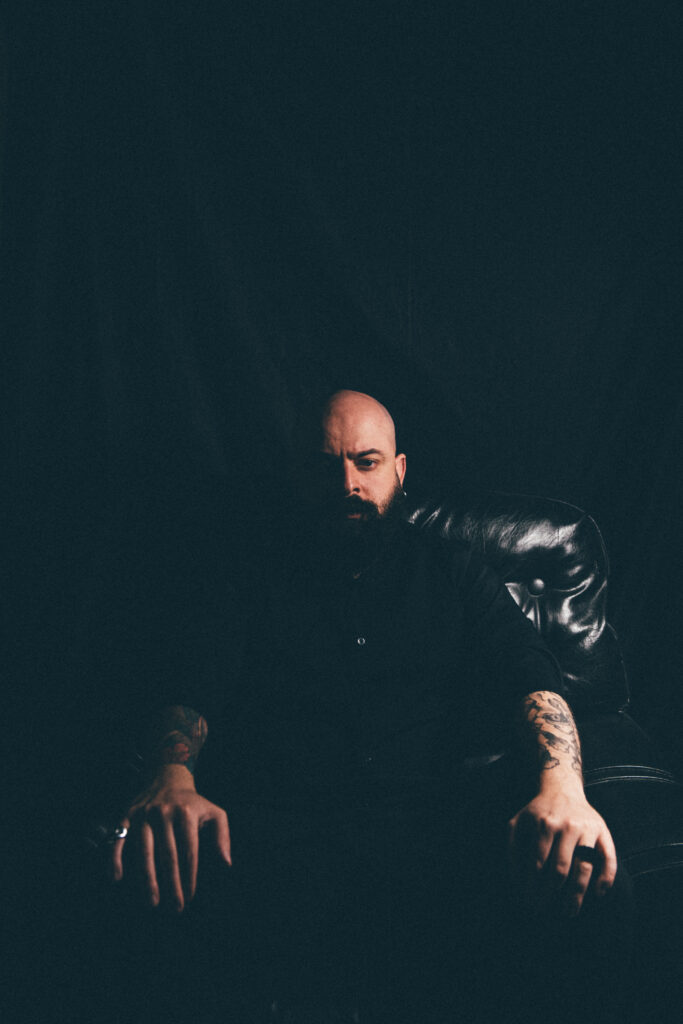
Rispetto al club, al dancefloor, com’è cambiato nel tempo il tuo rapporto con quel mondo? Hai percepito differenze dopo la pandemia?
Sì, molto. Sono cambiate le generazioni e anche il modo di ascoltare. Oggi vedo un pubblico più attento e curioso.
Secondo me, questa evoluzione è anche geografica: la techno, che prima viveva più nelle periferie, ora è entrata in città. È diventata una musica che frequentano anche persone di ambienti diversi, più trasversali, anche socialmente.
Negli anni ti sei costruito un percorso molto coerente. Ti senti parte della “scena napoletana” o pensi che sia qualcosa ormai superato?
Napoli resta dentro, sempre. La scena techno napoletana degli anni ’90 ha forgiato tanti di noi. Rino Cerrone, come Gaetano Parisio e lo stesso Marco Carola hanno iniziato tutto, lo dice la storia.
Ho un rapporto speciale con Gaetano Parisio: ci capiamo anche fuori dalla musica, condividiamo la stessa visione. È una persona generosa, un punto di riferimento. Abbiamo persino vissuto esperienze quasi simili, anche a livello personale.
Una bella coincidenza.
Sì. Ci unisce l’ironia e il senso di realtà. Le origini sono un po diverse, eppure, quando parliamo, la lingua è la stessa: quella dell’autenticità.
Cosa resta, oggi, della techno napoletana di quegli anni?
Resta la mentalità. Quella voglia di fare, di costruire, di essere veri.
Oggi le cose sono cambiate, ma quello spirito sopravvive in chi continua a mettere il suono al centro di tutto.
E come si fa a mantenerlo?
Con semplicità. Anche condividendo una cena. Può sembrare banale, ma parlare, mangiare insieme, creare un legame umano cambia tutto. È così che si mantiene viva la musica: attraverso le persone.
Oggi rappresenti una continuità ma anche una nuova generazione che ha portato il suono napoletano in territori più ampi e sofisticati. Hai una forte credibilità artistica, di chi è cresciuto culturalmente e musicalmente, hai collaborato con etichette internazionali. Come vivi questo legame? E in che direzione, secondo te, si sta muovendo oggi la scena partenopea?
Credo che Napoli sia una delle poche città dove l’identità musicale è rimasta quasi del tutto intatta. Se parliamo di techno, qui c’è ancora un suono riconoscibile, autentico ed anche nostalgico. Altrove i trend vanno e vengono, a Napoli invece, flessioni a parte è rimasto solido.
Ci sarà un cambio, servono tempo e spazi.
Napoli è una città piena di influenze. Pensa a come sta tornando fuori il “Napoli Power”, a certe sonorità di Pino Daniele, James Senese, Tullio De Piscopo o gli Osanna. Io stesso ho quelle influenze dentro di me. Da piccolo suonavo la batteria, e il mio riferimento era proprio De Piscopo.
La techno semplicemente convive con tanti altri linguaggi.
Forse manca una rete, un collegamento stabile tra le varie scene?
Sì, anche quello. Oggi fare musica è un privilegio, e vivere di musica lo è ancora di più. Molti ragazzi non hanno tempo né condizioni economiche per dedicarsi davvero. Mancano strutture, continuità nei club, spazi che permettano di crescere. È una precarietà che ti spinge verso altro, verso la sopravvivenza. Ecco perché dico che chi riesce a vivere di musica oggi è fortunato: non tutti possono permettersi di seguire la propria passione fino in fondo.
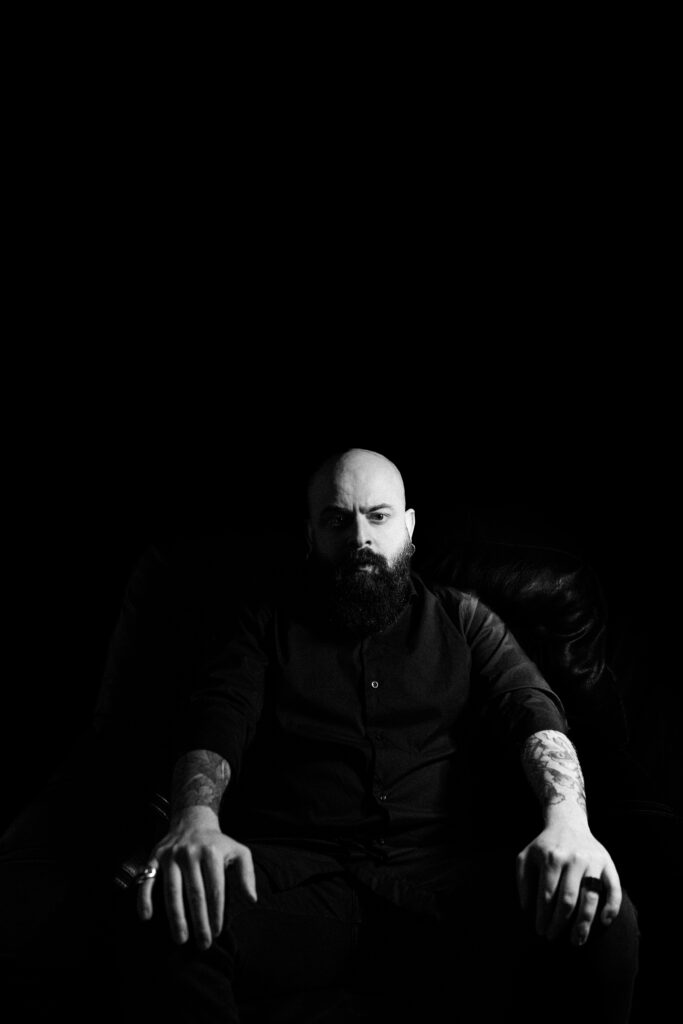
Come valuti oggi la scena italiana? C’è fermento, ma anche molta frammentazione.
Penso che l’Italia stia vivendo uno dei momenti più deboli della sua scena. Manca un’identità. Oggi tutti vogliono le cose facili, veloci, quelle che danno profitto immediato. Le realtà che costruiscono davvero qualcosa, che cercano di portare avanti un’idea o un suono, sono pochissime. E spesso fanno fatica: ogni weekend lottano per rientrare nelle spese, ma continuano con passione.
L’Italia importa trend, si arriva sempre in ritardo: quando da noi esplode, altrove è già ai titoli di coda. Non è una questione di mezzi, è una questione di voglia. Manca la volontà di rischiare: si preferisce seguire ciò che funziona. Ma chi resiste, chi tiene duro e continua a credere nella propria idea musicale, va rispettato davvero.
Oggi i club sono tornati a essere luoghi di libertà e resistenza, ma restano spazi fragili, sotto pressione. Da artista e label owner, quanto è difficile restare coerenti?
È difficilissimo. Devi avere carattere, devi essere testardo. Dopo il disco su Axis Records, ho detto: ok, basta cavolate, devo portare avanti la mia credibilità musicale.
Dopo “Coordinated Beatdown”, cosa ti piacerebbe esplorare? Hai già in mente nuove collaborazioni o progetti per South Signatures?
Sì, ma con calma. Non mi precludo nulla: ho fatto tanta musica, anche per me stesso, e voglio farla uscire. Ripartirò con i live dopo cinque anni. E sì, ci saranno collaborazioni, ma senza fretta. Ogni cosa a suo tempo.
È stato un vero piacere parlare con te, Raffaele. Grazie!
Grazie a voi!
ENGLISH VERSION
Raffaele Attanasio: “Making music means creating, not reproducing“
On the occasion of the release of “Coordinated Beatdown EP”, we had the pleasure of meeting Raffaele Attanasio to talk about his latest work with The Advent, the birth of South Signatures Records and how, today, techno can still be a matter of authenticity.
Raffaele Attanasio is one of the most recognisable voices on the Italian and international techno scene. Between his productions for Axis Records and his work with his own label South Signatures Records (SOU), his career has been marked by constant evolution, combining club culture and integrity as a form of artistic resistance.
“Coordinated Beatdown EP” is a direct, compact work that restores techno to its physical essence. Released on South Signatures Records on 3 October – on vinyl and digitally – the record moves with rigour and instinct.
Four tracks, four variations on a common idea: sound as living matter.
At the heart of the project is a dialogue with The Advent (Cisco Ferreira) – a pioneer of the British techno school – who meets the more physical and Mediterranean approach of Raffaele Attanasio. The result is a hybrid sound, where English geometry and Neapolitan sensibility merge into the same idea of authenticity.
“Binary Pulse” opens with a sharp impact, followed by “Echo Alliance“, which delves deeper through continuous frequency tension. “Divide” brings balance and suspension, an almost meditative moment, ending with “Spillo“, which closes with a different, more intimate, almost melancholic light.
Hello Raffaele, welcome to Parkett!
Let’s start with “Coordinated Beatdown EP”: a direct work, where every sound seems to have a specific intention. How did this project come about?
It all started very spontaneously, from a chat.
We combined the ideas of two people who have experienced different eras of techno: Cisco in one era, me in another, and now we are experiencing yet another together. Cisco sent me some material and that’s where it all started.
The project was supposed to come out in April, but then it was delayed due to a long period of forced downtime – and maybe that was a good thing, because the time was good for the record. Today, the tracks are doing really well: it’s an EP that was created calmly, without strategy, and perhaps that’s why it’s had more impact.
So it all came about during a second phase?
Yes. It was one of those situations where you realise how much music keeps you alive. After the forced break, I started listening again, tweaking the sounds, sitting down in front of the machines. It was a way of finding balance again.
And then, I must say, this project also had a very personal meaning for me. Coordinated Beatdown is dedicated to a friend who is no longer with us, someone with whom I shared so much.
It’s a direct, genuine work, born out of shared energy and a feeling of gratitude.
Cisco Ferreira, alias The Advent, is an artist with a very different background from yours. How did this collaboration come about and what kind of relationship developed between you?
From a distance, with a very strong rapport. We didn’t set any rules: we let ourselves be guided by the sound. I believe that, in reality, we are not so different – just two different ways of saying the same thing. Mine is sometimes more melodic, his more direct, yet the result was a natural meeting point.
It proves that you can speak the same language even with different accents.
How did you work on the EP, technically speaking? How do you prepare a studio setup?
In the case of collaborations, such as with Cisco, once I receive the parts, I load them into the project and start a sort of sound Tetris: I put them together, cut, change, add. I work a lot on sound design: I move sounds around, let them breathe, look for the right timbre and the dialogue between harmony and rhythm. If an idea doesn’t work, it gets thrown out immediately.
Before starting a project, I also spend whole days preparing my templates: it’s a way of having everything ready, like preparing your instruments before playing. I turn on the synthesizers, create templates, personal patches, sound combinations, bass lines, melodies. Then, when the time is right, I record. From the gut. I already think about how the sounds will fit together.
So the manual aspect is still central.
I like the imperfection of machines, the way they react.
Do you ever completely change direction on a track?
Often. In “Coordinated Beatdown”, for example, I redid the last track four or five times. It had a more melodic line, but it didn’t reflect the identity of the project. If an idea doesn’t flow, as I said before, I throw it away and start again.
When you work on other people’s music, as in this case, you have a double responsibility: to respect their identity but also to enrich it with your own. Cisco gave me total freedom, and that’s fundamental.
Did you set yourself any rules?
Yes and no. During the creative process, I look for spontaneity. When you have a well-defined basic sound, the rest comes naturally. If you know your equipment well, you already know where to go. Everything starts with the sound: the construction, the physicality, the dynamics. Especially in this case, they have to maintain that “physical” drive that comes from the club, from the dance floor.
Let’s talk about your label, South Signatures Records (SOU). How did it come about and what identity do you want to give it?
It came about out of a personal need: I no longer wanted to be subject to deadlines or creative pressures. I wanted total freedom, the chance to develop my ideas without restrictions. I already had a specific sound in mind: pure techno, dancefloor-oriented, without too many frills. SOU is a techno project.
The discs are now pressed by Matter of Fact in Gustrow, which also handles printing and distribution.
Yet the name South Signatures refers to your origins.
The roots remain, but it is above all a way of understanding music as something human, authentic.
The label was not created to make money, but mainly to give space to concrete projects. I collaborate with friends, with artists I admire, because that is the basis – mutual trust and respect.
When you produce, do you think of the club as a physical space? Do you imagine the audience’s reaction?
I put myself in the listener’s shoes: if I heard this track on the dance floor, would I dance to it? If the answer is no, then it’s no good. When I feel that it works, that it moves me, then yes: I know I’m doing the right thing.
Electronic music, even if it’s made with machines, must have a soul.
If you look at it only from a technical point of view, you risk creating something cold and mechanical.
How much does your training as a pianist influence your work?
My classical training has helped me, of course, but today it’s not essential.
The point is not how well you can play, but how well you can develop an idea.
Today there are tools that allow you to create even if you haven’t studied music: you just need to know what you want to say and how to build it. Training can speed up the process, but it doesn’t guarantee creativity.
So isn’t it necessarily an advantage?
Not always. Having a background as a pianist doesn’t automatically make you a good creator. There are those who have studied little but know how to express ideas much more effectively than those who have extensive training.
Making music means creating, not reproducing. The musician performs, the producer invents worlds. You can’t judge a book by its cover, even in music.
With regard to clubs and dancefloors, how has your relationship with that world changed over time? Have you noticed any differences since the pandemic?
Yes, a lot. Generations have changed, and so has the way people listen. Today, I see a more attentive and curious audience.
In my opinion, this evolution is also geographical: techno, which used to be more prevalent in the suburbs, has now entered the city. It has become a music that is also enjoyed by people from different backgrounds, more transversal, even socially.
Over the years, you have built a very consistent career. Do you feel part of the “Neapolitan scene” or do you think it is something that is now outdated?
Naples remains inside, always. The Neapolitan techno scene of the 1990s shaped many of us. Rino Cerrone, Gaetano Parisio and Marco Carola himself started it all, as history tells us.
I have a special relationship with Gaetano Parisio: we understand each other even outside of music, we share the same vision. He is a generous person, a point of reference. We have even had similar experiences, even on a personal level.
What a nice coincidence.
Yes. We are united by irony and a sense of reality. Our origins are a little different, yet when we talk, we speak the same language: that of authenticity.
What remains today of the Neapolitan techno scene of those years?
The mentality remains. That desire to do, to build, to be true.
Things have changed today, but that spirit survives in those who continue to put sound at the centre of everything.
And how do you maintain it?
With simplicity. Even by sharing a meal. It may seem trivial, but talking, eating together, creating a human bond changes everything. That’s how you keep music alive: through people.
Today, you represent continuity but also a new generation that has brought the Neapolitan sound to wider and more sophisticated territories. You have strong artistic credibility, having grown up culturally and musically, and you have collaborated with international labels. How do you experience this connection? And in what direction, in your opinion, is the Neapolitan scene moving today?
I believe that Naples is one of the few cities where musical identity has remained almost completely intact. If we talk about techno, there is still a recognisable, authentic and even nostalgic sound here. Elsewhere, trends come and go, but in Naples, apart from a few dips, it has remained solid.
There will be a change, but it will take time and space.
Naples is a city full of influences. Think about how “Napoli Power” is making a comeback, with certain sounds from Pino Daniele, James Senese, Tullio De Piscopo and Osanna. I myself have those influences within me. When I was a child, I played the drums, and my reference point was De Piscopo.
Techno simply coexists with many other languages.
Perhaps there is a lack of a network, a stable connection between the various scenes?
Yes, that too. Today, making music is a privilege, and making a living from music is even more so. Many young people don’t have the time or financial means to really devote themselves to it. There is a lack of facilities, continuity in clubs, and spaces that allow them to grow. It’s a precariousness that pushes you towards something else, towards survival. That’s why I say that those who manage to make a living from music today are lucky: not everyone can afford to follow their passion to the end.
How do you assess the Italian scene today? There is excitement, but also a lot of fragmentation.
I think Italy is experiencing one of the weakest moments in its scene. It lacks identity. Today, everyone wants things that are easy, fast, and immediately profitable. There are very few realities that are really building something, that are trying to promote an idea or a sound. And they often struggle: every weekend they fight to cover their expenses, but they continue with passion.
Italy imports trends, always arriving late: when something explodes here, elsewhere it is already on its way out. It is not a question of means, it is a question of desire. There is a lack of willingness to take risks: people prefer to follow what works. But those who resist, who hold on and continue to believe in their musical idea, deserve real respect.
Today, clubs have returned to being places of freedom and resistance, but they remain fragile spaces, under pressure. As an artist and label owner, how difficult is it to remain consistent?
It’s very difficult. You have to have character, you have to be stubborn. After the record on Axis Records, I said: OK, enough nonsense, I have to maintain my musical credibility.
After “Coordinated Beatdown”, what would you like to explore? Do you already have new collaborations or projects in mind for South Signatures?
Yes, but take it easy. I’m not ruling anything out: I’ve made a lot of music, even for myself, and I want to release it. I’ll be starting live performances again after five years. And yes, there will be collaborations, but no rush. Everything in its own time.
It has been a real pleasure talking to you, Raffaele. Thank you!
Thank you!

